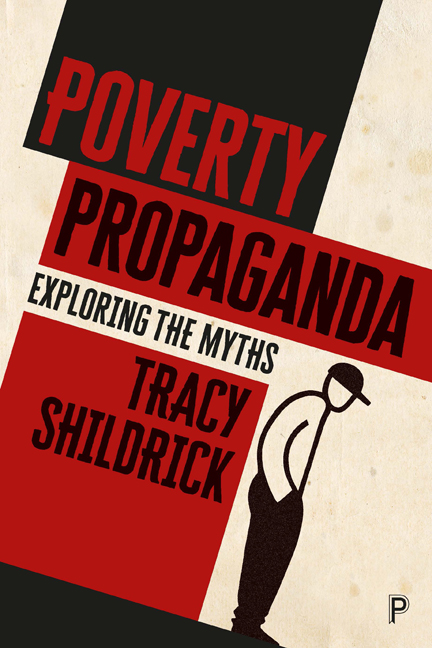Book contents
- Frontmatter
- Contents
- List of abbreviations
- Acknowledgements
- One Introduction
- Two Poverty propaganda
- Three Poverty and lived experiences
- Four Poverty, labour markets and ‘poor work’
- Five Poverty, social class and social immobility
- six Poverty: discrimination, stigma and shame
- Seven Poverty propaganda and reproduction of poverty, power and inequality
- Eight Conclusions
- References
- Index
Seven - Poverty propaganda and reproduction of poverty, power and inequality
Published online by Cambridge University Press: 09 April 2022
- Frontmatter
- Contents
- List of abbreviations
- Acknowledgements
- One Introduction
- Two Poverty propaganda
- Three Poverty and lived experiences
- Four Poverty, labour markets and ‘poor work’
- Five Poverty, social class and social immobility
- six Poverty: discrimination, stigma and shame
- Seven Poverty propaganda and reproduction of poverty, power and inequality
- Eight Conclusions
- References
- Index
Summary
Introduction
Writing in 1845, Friedrich Engels argued that
When an individual inflicts bodily injury upon another, such injury that death results, we call the deed manslaughter; when the assailant knew in advance that injury would be fatal, we call this deed murder. But when society places hundreds of proletarians in such a position that they inevitably meet an early and unnatural death, one which is quite as much a death by violence as that by the sword or the bullet; when it deprives thousands of the necessities of life, places them under conditions in which they cannot live - forces them through the strong arm of the law, to remain in such conditions until death ensues, which is the inevitable consequence – knows that these thousands of victims must perish, yet permits these conditions to remain,its deed is murder just as surely as the deed of the single individual; disguised, malicious murder. (Engels, 1845(2009), p 106)
As the chapters of this book have demonstrated, the most economically marginalised in our society, including those experiencing sometimes very deep poverty, are facing deliberately sustained, brutal and unforgiving assaults on their life chances and conditions. The quotation above is no less relevant today than it was when it was written well over 150 years ago. Indeed we could argue that it is even more relevant, given the wealth and general increases in living standards that have ensued since. Those on lower incomes have long faced poorer health and life chances in general but since 2010 austerity has added an additional, unnecessary and particularly brutal layer of disadvantage to already difficult life conditions. The increased incidence of early death (Dorling, 2017), along with starvation and the rise in forced destitution, might sound like they belong in a different century, but they are the new reality for many in a callous and unforgiving economic system that creates hostile, life-limiting and in some cases life-destroying conditions for those on low incomes. This chapter looks at the consequences of poverty propaganda in terms of policy responses to poverty that make life worse for those on low incomes. It also explores how and why these policy developments are tolerated – and even desired – by a general public that largely tends to buy into the value of poverty propaganda at least on some level.
- Type
- Chapter
- Information
- Poverty PropagandaExploring the Myths, pp. 131 - 150Publisher: Bristol University PressPrint publication year: 2018



